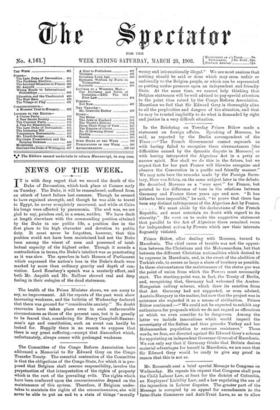Prince Billow, after dealing with Morocco, turned to Macedonia. The
chief cause of trouble was not the opposi- tion between the Christians and the Mohammedans, but that between the different Christian nationalities which desired to be supreme in Macedonia, and, in the event of the abolition of Turkish rule, to secure as large a abate of territory as possible. In these circumstances the maintenance of the status quo was the point of union from which the Powers must necessarily start. The starting-point was, in fact, the Treaty of Berlin, and, recognising that, Germany had welcomed the Austro- Hungarian railway scheme, which drew its sanction from that Act. Germany had not supported, or even advised, Austria-Hungary in the matter, but now that the project was in existence she regarded it as a means of civilisation. Prince Billow continued :—" We could not be expected to exhibit any enthusiasm for proposals which we do not regard as efficacious or which we even consider to be dangerous. Among the latter we include innovations which would imperil the sovereignty of the Sultan and thus provoke Turkey and her Mohammedan population to extreme resistance." These words, we fear, are directed against Sir Edward Grey's scheme for appointing an independent Governor-General of Macedonia. We can only say that if Germany thinks that Britain desires material advantages for herself in Macedonia, we are sure that Sir Edward Grey would be ready to give any proof in reason that this is not so.










































